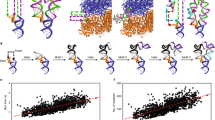Abstract
DNA and RNA molecules have proven to be very versatile materials for programmable construction of nano-scale structures and for controlling motion in molecular machines. RNA molecules are also increasingly in the spotlight in recognition of their important regulatory and catalytic roles in the cell and their promise in therapeutics. Function follows form in the molecular world and so our ability to understand nucleic acid function in the cell, as well as to design novel structures, is enhanced by reliable means for structure prediction.
Prediction methods for designed molecules typically rely on a thermodynamic model of structure formation. The model associates free energies with loops in the structure, and the overall energy of a structure is the sum of its free energies. From the energy model, the folding pathway, the structure with minimum free energy, or the probabilities of base pair formation, can be computed, Thus, the quality of predictions is limited by the quality of the energy model. In this talk, we will describe progress towards more accurate structure prediction, enabled by improved inference of energy parameters and by new algorithms. We will also describe some interesting problems in design of nucleic acids that have prescribed structure or folding pathways.
Access this chapter
Tax calculation will be finalised at checkout
Purchases are for personal use only
Similar content being viewed by others
Author information
Authors and Affiliations
Editor information
Rights and permissions
Copyright information
© 2008 Springer-Verlag Berlin Heidelberg
About this paper
Cite this paper
Condon, A. (2008). Computational Challenges and Opportunities in the Design of Unconventional Machines from Nucleic Acids. In: Calude, C.S., Costa, J.F., Freund, R., Oswald, M., Rozenberg, G. (eds) Unconventional Computing. UC 2008. Lecture Notes in Computer Science, vol 5204. Springer, Berlin, Heidelberg. https://doi.org/10.1007/978-3-540-85194-3_2
Download citation
DOI: https://doi.org/10.1007/978-3-540-85194-3_2
Publisher Name: Springer, Berlin, Heidelberg
Print ISBN: 978-3-540-85193-6
Online ISBN: 978-3-540-85194-3
eBook Packages: Computer ScienceComputer Science (R0)




